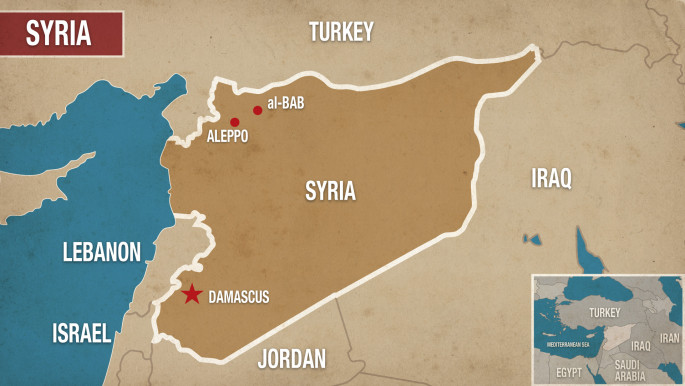Will Assad and Turkey clash or cooperate in al-Bab?
Since early November, the Turkish military, and its allied Free Syrian Army (FSA) militia have laid siege to the Islamic State group in the northwestern Syrian city of al-Bab.
Most of the casualties sustained by these Turkish and FSA forces since their incursion into northwest Syria last August have been in this three-month siege, where IS has put up stiff resistance against the fighters to the north, east and west of the city.
Now, the Syrian regime are approaching the city from the south. At time of writing, they are no less than nine kilometres away and have cut off IS' main supply route into al-Bab from the southeast.
However, seizing al-Bab will remain a difficult task for either or both Syrian and Turkish ground forces, given how deeply entrenched IS is there.
Concerns have also arisen that the Syrian regime might clash with the Turkish-FSA force in the process. Damascus has bitterly denounced the Turkish incursion since day one. Furthermore, an Iranian-made drone, possibly operated by Iranian-backed Shia paramilitaries backing Assad, is believed to have killed four Turkish soldiers in an airstrike on November 24.
Syrian regime forces are also being supported by the Lebanese Shia Hizballah militia in this latest offensive.
 |
Turkey's Deputy Prime Minister Mehmet Simsek admitted that facts on the ground in Syria had changed |  |
The offensive comes after a largely successful ceasefire was brokered in Syria ahead of the Russian-sponsored Astana talks last month, attended by Russia along with Syria, Iran and Turkey and the official Syrian opposition.
Turkey appears to have relinquished its long-held goal of ousting the Syrian regime of President Bashar al-Assad by supporting the various opposition groups arrayed against him. Just three days before the Astana talks began (January 23) Turkey's Deputy Prime Minister Mehmet Simsek admitted that facts on the ground in Syria had changed and it was no longer realistic for Turkey to insist on a settlement to the Syrian conflict without including Assad.
 |
|
| [Click to enlarge] |
The current Syrian ceasefire, like several before it, excludes IS and the group formerly known as the Nusra Front. Consequently, Damascus has focused on advancing towards al-Bab, 40 kilometres northeast of Aleppo.
Their aim is likely to consolidate control over more territory in that important region while also contesting Turkish control by establishing new facts on the ground.
Whether they will clash remains uncertain. Russia, Assad's primary military backer in Syria, has been coordinating airstrikes with Turkey against IS in al-Bab since last month. Also, a clash between Syria and Turkey around al-Bab would likely violate the ceasefire.
This is something Russia is likely to oppose - since it is now working with both sides and wants the ceasefire to hold in order to give Moscow a prime position to advance its own interests when negotiations over an end to the conflict finally take hold.
| Read more: Turkey starts building up its Syria buffer zone |
On February 9, a clash erupted between Syrian regime forces and these Turkish-backed FSA forces southwest of al-Bab. The FSA claim the regime provoked the incident when they moved towards their positions. Russian mediation reportedly prevented the clash from escalating into a full-fledged confrontation.
"Russia intervened to calm down the situation," one of the FSA militiamen told France 24. "This whole incident felt like a test."
Turkey is adamant that if it captures al-Bab from IS, it will not return control over the city back to Damascus.
Damascus is likely aiming to at least establish a foothold in the city's south to complicate any post-IS Turkish efforts to consolidate control over the city, either directly or through its FSA allies.
 |
If the Kurds were to take al-Bab, it would link all territories they currently hold in northern Syria into one contiguous bloc |  |
Russia, which acquiesced to Turkey's ongoing operation since Ankara limited itself to solely targeting IS and Syrian Kurdish-led forces in that region, would likely favour Syria's claim to the city. Consequently, it could either try to organise some kind of face-saving withdrawal plan for Turkey - possibly assuring them that Damascus would prevent the Kurds from later being given access to al-Bab.
If the Kurds were to take al-Bab, it would link all territories they currently hold in northern Syria into one contiguous bloc.
Any arrangement to avoid that eventuality organised by Moscow will likely be easier to implement in the air since Russian-Turkish jets are already coordinating, and Moscow has long coordinated air operations with Damascus.
On the ground, things might be more complicated. Turkey's FSA allies have spoken in the past of how discontented they felt confined to the northwest fighting IS and the Kurdish-led forces - they wanted to go to Aleppo to fight Assad. It will therefore be hard for them to work arm-in-arm with these very same forces.
More Turkish forces have been sent to al-Bab to bolster the offensive in recent weeks. As a result, Turkey could withdraw these troops in return for working with Russian and Syrian military forces in al-Bab.
Whatever the case may be, these latest Syrian advances are already complicating further the already-complicated situation on the ground in Syria's northwest.
Follow him on Twitter: @pauliddon





 Follow the Middle East's top stories in English at The New Arab on Google News
Follow the Middle East's top stories in English at The New Arab on Google News


